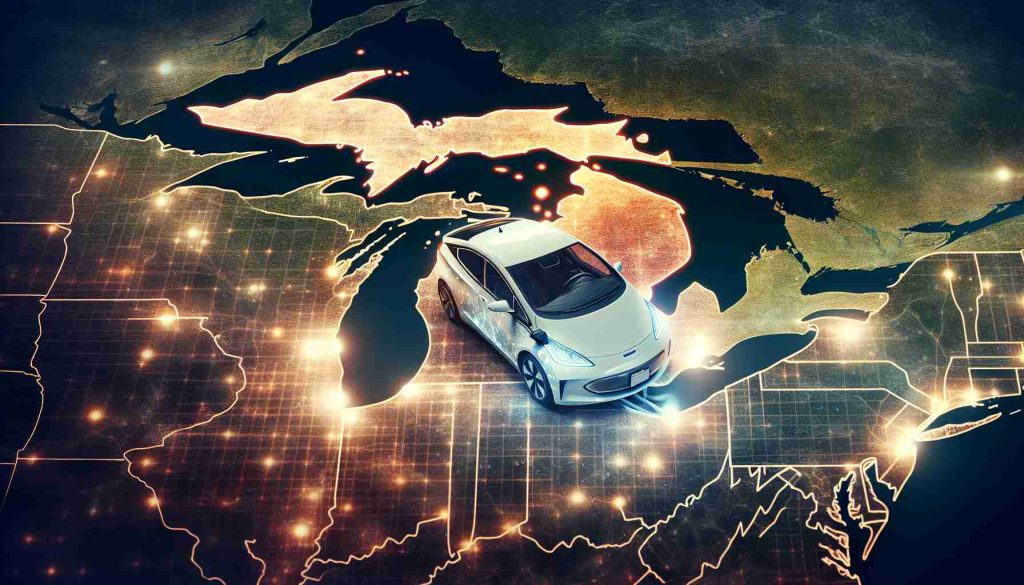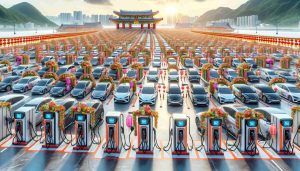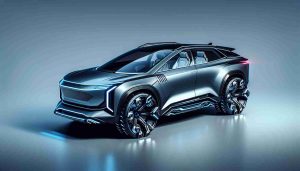Electric Vehicles: Is Michigan the Next Automotive Powerhouse?

The Future of Electric Vehicles in Michigan
Despite recent political challenges, Michigan is emerging as a powerhouse in the electric vehicle (EV) sector. An impressive investment of over $27 billion is being funneled into around 60 EV and battery projects, surpassing Georgia’s own $26.6 billion commitments. This investment is a testament to Michigan’s enduring legacy as the birthplace of the automotive industry, while also marking its evolution towards a sustainable future.
Among the transformative developments is Factory Zero, where General Motors is producing electric Hummers and Silverados. Furthermore, a $1.6 billion battery manufacturing facility in Van Buren Township aims to generate more than 2,100 jobs and produce 200,000 battery packs annually. Innovative spaces like Newlab in Detroit’s Corktown are fostering collaboration among tech entrepreneurs and automotive experts.
In the face of changing federal policies, local auto dealers are adapting: one dealer is upgrading his business for EV support, training technicians, and installing chargers to meet the growing demand. Meanwhile, initiatives like Blast Detroit are preparing the next generation of technicians in EV technology, ensuring Michigan’s workforce is ready for the electric transition.
Even as some automakers reassess their electric ambitions amid policy shifts, the demand for sustainable automotive solutions remains strong. In Michigan, the future of electric vehicles continues to shine bright, as investments and innovation pave the way for a cleaner, greener automotive landscape.
The Broader Implications of Michigan’s Electric Vehicle Renaissance
Michigan’s robust investment in electric vehicles (EVs) has profound implications that extend beyond the local economy and into the global landscape. As the epicenter of automotive innovation, the state is poised to reshape the future of transportation and infuse new life into the sector by aligning with global sustainability goals.
The shift towards electrification is critical, as vehicles account for nearly 29% of greenhouse gas emissions in the United States. Transitioning to EVs could potentially reduce carbon footprints significantly. Moreover, as automakers pivot to electric platforms, the entire supply chain is being revitalized, leading to a diversification of job opportunities ranging from manufacturing to software development. More than 5 million jobs in the U.S. automotive sector may ultimately depend on this transition, demanding a skilled workforce adept in these new technologies.
Furthermore, the rise in electric vehicles is likely to stimulate global markets for batteries and renewable energy. The demand for lithium and cobalt, essential for EV batteries, raises questions about mining practices and sustainability. Additionally, states like Michigan could provide a blueprint for other regions aiming to embrace green technologies.
Looking ahead, we can expect the automotive landscape to transform remarkably, with consumer preferences shifting toward sustainability. This trend could escalate innovations in adjacent sectors, such as renewable energy and smart grid development, amplifying the long-term significance of Michigan’s commitment to electric vehicles. As the state accelerates this transition, it may indeed influence national policies and global practices, heralding a new era of eco-conscious driving.
Michigan’s Electric Vehicle Boom: What You Need to Know
The Future of Electric Vehicles in Michigan
Michigan is quickly establishing itself as a leader in the electric vehicle (EV) industry, showcasing a commitment to innovation and sustainability. With an impressive $27 billion investment into approximately 60 EV and battery projects, the state not only stands out against other regions, like Georgia—who has pledged $26.6 billion—but it also leans into its automotive heritage.
# Key Features and Projects
Among the highlights in Michigan’s EV landscape is Factory Zero operated by General Motors, where the production of electric Hummers and Silverados is taking place. The state also welcomes a $1.6 billion battery manufacturing facility in Van Buren Township, projected to create over 2,100 jobs and capable of producing 200,000 battery packs annually. Such large-scale developments are key to meeting future demand for EVs and battery storage solutions.
Locations like Newlab in Detroit’s Corktown signify a forward-thinking approach, blending technology and automotive expertise to drive innovation in the EV sector. This collaborative working space encourages partnerships among tech entrepreneurs and traditional automotive manufacturers, fostering an environment ripe for breakthrough developments.
# Workforce Adaptation and Education
As federal policies concerning electric vehicles evolve, local auto dealers are proactively adapting their businesses. This includes upgrading to support EVs, offering training for technicians, and installing charging stations to accommodate the growing number of electric vehicles. Additionally, initiatives like Blast Detroit focus on preparing the next generation of technicians skilled in EV technology, highlighting a comprehensive approach that ensures Michigan’s workforce is aligned with the future of mobility.
# Pros and Cons
Pros:
– Significant investment fostering job creation and innovation.
– Strong state commitment to sustainability and green technology.
– Collaboration between tech entrepreneurs and traditional auto industry.
Cons:
– Potential risks associated with shifting federal policies.
– Challenges in scaling workforce training to meet rapid industry changes.
# Sustainability and Market Trends
As the demand for sustainable automotive solutions remains robust, Michigan’s investments are timely and critical. The continued focus on EV technology not only positions Michigan as a hub for green mobility but also plays a vital role in reducing the automotive industry’s carbon footprint.
# Security Aspects and Innovations
The state’s commitment to secure supply chains for battery production and EV manufacturing is crucial. Innovations in battery technology are being prioritized, with a focus on increasing efficiency and sustainability. Moreover, Michigan’s auto industry is adopting advanced security measures against cyber threats, ensuring that as technology advances, so do the protections in place.
# Future Predictions
Looking ahead, analysts predict that Michigan will not only increase its EV market share but also lead in various aspects of EV technology, especially in battery innovations and renewable energy integration. The state’s efforts to nurture startups and attract established automotive players show promise for solid growth and innovation in the coming years.
For more insights into electric vehicles and their future in Michigan, visit Michigan’s official website.



